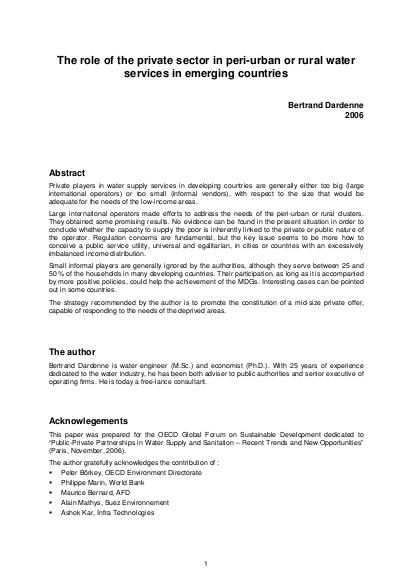
Private players in water supply services in developing countries are generally either too big (large international operators) or too small (informal vendors), with respect to the size that would be adequate for the needs of the low-income areas. Large international operators made efforts to address the needs of the peri-urban or rural clusters. They obtained some promising results. No evidence can be found in the present situation in order to conclude whether the capacity to supply the poor is inherently linked to the private or public nature of the operator. Regulation concerns are fundamental, but the key issue seems to be more how to conceive a public service utility, universal and egalitarian, in cities or countries with an excessively imbalanced income distribution. Small informal players are generally ignored by the authorities, although they serve between 25 and 50 % of the households in many developing countries. Their participation, as long as it is accompanied by more positive policies, could help the achievement of the MDGs. Interesting cases can be pointed out in some countries. The strategy recommended by the author is to promote the constitution of a mid-size private offer, capable of responding to the needs of the deprived areas.
Links
Resource collections
- Evaluating humanitarian action
- UN Habitat - Urban Response Collection
- Urban Response - Urban Crisis Preparedness and Risk Reduction
- Urban Response Collection - Community Engagement and Social Cohesion
- Urban Response Collection - Economic Recovery
- Urban Response Collection - Environment and Climate Change
- Urban Response Collection - Housing, Land and Property
- Urban Response Collection - Urban Crisis Response, Recovery and Reconstruction
- Urban Response Collection - Urban Resilience